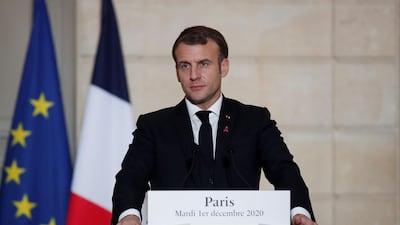France's president Emmanuel Macron is under renewed pressure to combat Islamist radicalisation within public services at the same time as he struggles to convince Muslims that his policies are not also anti-Islam.
Eric Diard, a centre-right opposition MP and author of a parliamentary report on the issue, says too little has been done to eliminate extremism and the rejection of French values from services including hospitals, schools, prisons and public transport.
He has now published a book entitled Radicalisation at the Heart of Public Services. Mr Diard also highlights a glaring need for genuinely ambitious plans to help young people on high-rise estates with large Muslim populations.
"Too many are being left abandoned to become easy prey for drug dealers and radicalisation," he told The National.
In a speech last month, intended to ease Muslim fears that he was targeting them as a whole, Mr Macron promised to end discrimination in jobs, housing and other areas.
Critics say that with attention focused on opposing separatism and “political Islam”, his encouraging words have not been followed by concrete proposals.
A bill to be presented to Mr Macron's cabinet next week will include strict new rules on education. School will be mandatory from the age of three from next September, home schooling curbed and foreign interference banned.
Action has already been taken to shut down mosques and several Muslim organisations, including the charity Collective Against Islamophobia (CCIF), considered by the French government to be enemies of the republic or apologists for violence.
Underlining the new strategy of zero tolerance, Mr Macron's interior minister Gerald Darmanin has announced searches at a further 76 mosques suspected of preaching separatism. He called it a "massive and unprecedented" operation as part of France's attack on "breeding grounds of terrorism".

Sixteen are in the Paris region, the rest spread around France. The minister tweeted that he would require the closure of anywhere suspicions were found to be justified.
France's main representative Muslim body, the French Muslim Council (CFCM), is being urged to embrace a charter endorsing republican values, rejecting foreign influence and accepting that Islam is a religion, not a political movement.
But Mr Diard believes the bill is inadequate. "Nothing is said about radicalisation in the health sector and universities, which are seriously affected by communitarianism," he told The National. "And there is nothing on prisons, a breeding ground for radicalisation."
The US-based Pew Research Centre estimates 5.7 million Muslims live in France, Europe's largest proportion of population.
While very few support the terrorist murders in Paris and Nice that followed the latest controversy over publication by the magazine Charlie Hebdo of cartoons mocking Islam and the Prophet Mohammed, there is much dismay at Mr Macron's subsequent comments.
The president has sought to persuade Muslims that it is extremism and not Islam that he is confronting.
But his attempts to defend Charlie Hebdo's right to publish offending material triggered a backlash. His phrase "we will never give up cartoons" left an impression with some that he was identifying the state with their publication rather than simply asserting the freedom of expression.
In an open letter to Mr Macron, nearly 30 European associations representing Muslims accused France of "adopting the policies of xenophobes and pandering to bigots".
"Maligning Islam and your own Muslim citizens, closing mainstream mosques, Muslim and human rights organisations, and using this as an opportunity to stir up further hatred, has given further encouragement to racists and violent extremists," it said.
The new book from Mr Diard and his co-author, the journalist Henri Vernet, presses the urgency of Mr Macron's agenda. Mr Diard says the parliamentary report presented only half of what he learnt from protracted research, including meetings with senior officials insisting on anonymity.
Public services are the ones seen as rejecting French values. Mr Diard told The National several schools failed to observe a nationwide homage to the murdered teacher because staff felt under threat from disaffected pupils or parents.
Some sectors of the public services are "plagued by this radicalisation", he says.
Signs range from the relatively trivial – bus drivers refusing to take money from female passengers or shake hands with female managers, or women in hospital insisting on being treated only by female doctors – to outright security threats.
Mr Diard found evidence non-terrorist convicts and even prison officers were at risk of indoctrination by terrorists or sympathisers also serving sentences.
He highlighted the difficulty of monitoring those released, unrepentant, after completing prison terms.
In October 2019, three months after Mr Diard's report was delivered to parliament, Mickael Harpon, an administrative employee at the Paris police headquarters and a convert to Islam, smuggled two kitchen knives into work. He killed four colleagues before being shot dead.
The report had warned that while police chiefs considered it "unthinkable" that an employee would turn on colleagues, there could be no certainty that an individual already radicalised would not be hired or that one might become radicalised after recruitment.
Mr Diard, who represents a constituency near Marseille, describes himself as "rather pessimistic" about the immediate future and says Mr Macron must honour promises to tackle inequality.
The president's pledges were an echo of Mr Diard's own view that prevention is the only solution.
His book cites government intentions to "bring the republic back to the estates, restore public services to their correct state, allow inhabitants to find work and change their world".
But he contrasts this with the state's "abandonment" of many such areas. A report from a former minister, Jean-Louis Borloo, calling for a latter-day Marshall Plan – the post-war US initiative to rebuild Europe – is widely seen as having been largely ignored.
Mr Diard's book concludes with the challenge: "What remains is to match words with action."


